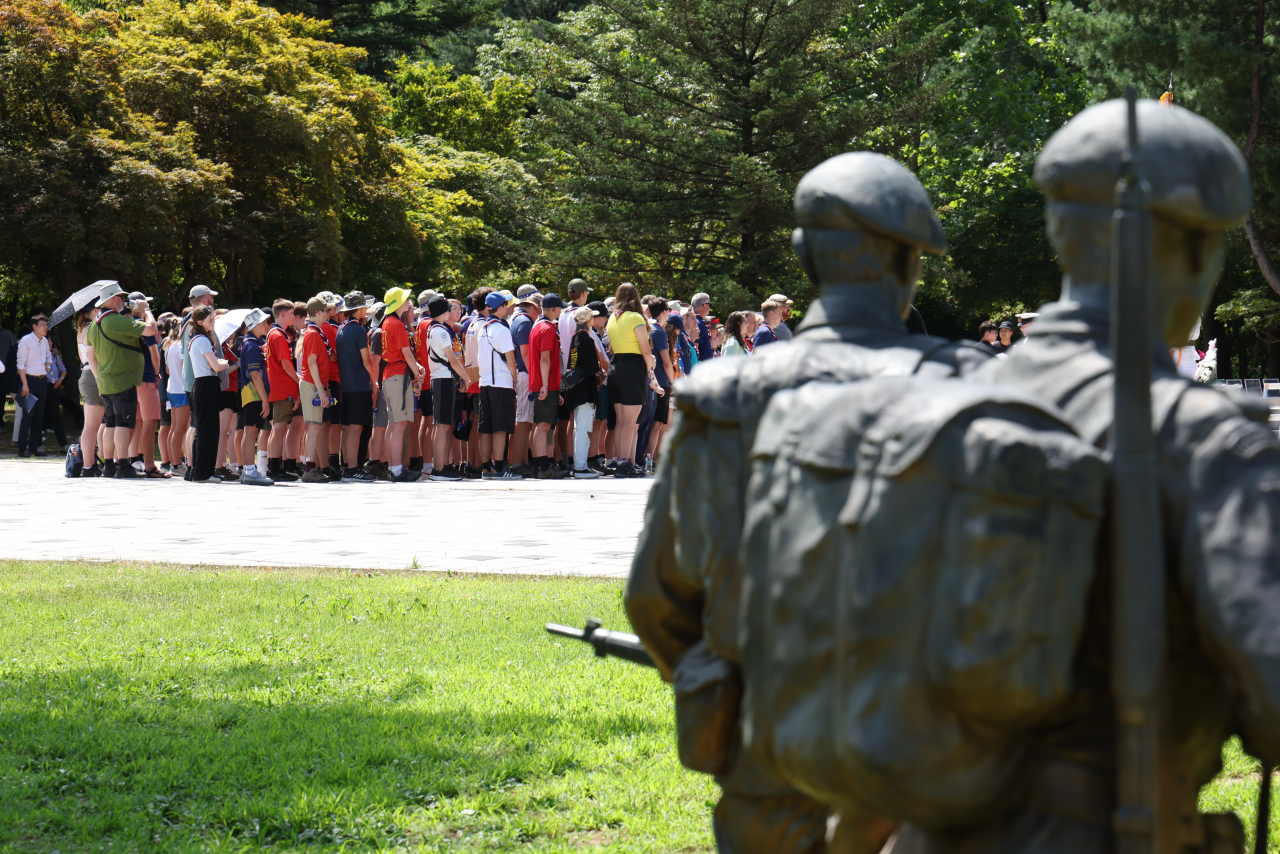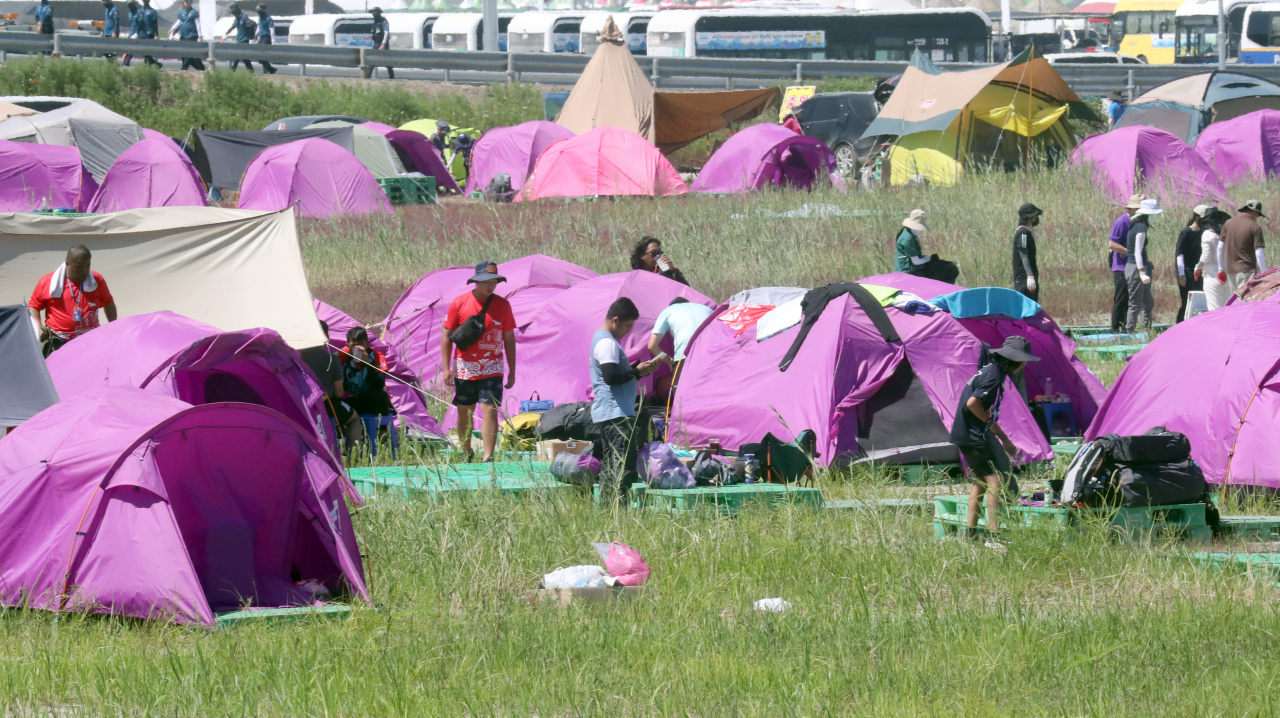How can Korea recover from Jamboree debacle?
Experts urge greater responsibility after initial operational setbacks
By Kim Hae-yeonPublished : Aug. 8, 2023 - 15:07

The World Scout Jamboree, a mega event that brings together tens of thousands of teenaged Scouts worldwide, presents a pivotal opportunity for the host country to boast its global brand value.
The ability to organize such large-scale events leaves lasting impressions on participants and observers alike, offering a platform to showcase the country's hospitality, dynamism and cultural richness.
With soaring expectations for the event in Saemangeum -- a reclaimed tidal flat area of Buan, North Jeolla Province -- some 43,000 participants from 158 countries officially gathered on Aug. 1. Korea aspired to leverage its soft power and booming cultural reputation. However, midway through the event, the country's efforts to position itself as a welcoming and alluring hub appear to have fallen far short.
With unrelenting heat and limited shade at the campsite, the risk of heat-related illnesses and insect bites grew on an hourly basis. Further apprehension over basic food hygiene and sanitation at the campsite facilities ultimately resulted in participants from Britain, the United States and Singapore leaving the site early.
Seoul was announced to host the 2027 World Youth Day by Pope Francis on Sunday. The Catholic youth event is projected to attract up to 300,000 overseas attendees. Meanwhile, the decision for Busan's bid for the 2030 World Expo is scheduled for November.
While a specific city has not yet been determined, the country has also secured a bid to host the Asia-Pacific Scout Jamboree in 2025, which expects to attract approximately 20,000 participants from around 40 countries.
"In the post-pandemic era, global attention is sharply focused on safety, hygiene and other potential hazards for such events" Bae So-young, a professor at Kyung Hee University's College of Hotel and Tourism Management, told The Korea Herald on Monday. "Even a minor oversight can pose a significant threat to the hosting country, and unfortunately, circumstances have unfolded in such a manner. An event like the World Scout Jamboree holds power to directly influence the country's ability to attract subsequent events."

According to the 2022 Nation Brands Index presented by Anholt-Ipsos, South Korea ranked 23rd on the list. The index, based on over 60,000 annual interviews of participants from the age of 18 and older, comprehensively measures how a country is perceived in comparison to its top competitors, considering tourism, commerce and other aspects that drive trust and positive perceptions of a country.
"The World Scout Jamboree’s impact on Korea’s image clearly extends beyond the present, as it involves teenagers whose perceptions can influence the national brand long-term when they become the older generation," said Shin Hak-seung, a professor at Hanyang University's Department of Tourism. "The transformative effect on a nation's brand of hosting such mega events has been substantiated by numerous studies.”
Shin mentioned Korea's shifting journey from the middle level to an advanced country in terms of its “global brand” as a nation, solidified through successfully hosting prominent festive events like the 1988 Seoul Olympics, 2002 Korea-Japan World Cup and 2018 PyeongChang Winter Olympics.
With all eyes focused on wrapping up the Jamboree event on a relatively positive note, some 37,000 remaining Scouts began leaving their campsites Tuesday, taking precautionary measures against a typhoon approaching the peninsula. The Scouts will disperse to various regions to continue their activities until Friday, when they will reunite at Seoul World Cup Stadium in the capital for the closing ceremony and a K-pop concert.
With new plans quickly arranged and coordinated by both the public and private sector, experts highlighted the importance for the host country to avoid a quagmire of negative sentiment and instead concentrate on optimizing available resources.
"As with any large-scale event, it's easy for this year's Jamboree to trigger a ‘negativity bias’ on Korea's brand, where bad memories associated with high-stress situations tend to linger longer in memory than positive ones," commented Yoo Jae-woong, former presidential secretary for public relations planning, who currently heads the Korea Center for Crisis Communication.
Yoo emphasized that this perception becomes more pronounced when “stakeholders,” the Scouts in this case, have held high expectations for the country's image and soft power.
"In scenarios marked by challenges, quick-witted responses become even more crucial. A good example of this is the recent Ministry of Patriots and Veterans Affairs’ swift plan to orchestrate a meaningful program that engaged both British veterans and Jamboree participants," Yoo noted.
In the days that lie ahead, he emphasized that a final chance to improve initial impressions still remains, which can be fulfilled by presenting an organized and captivating content, while ensuring the prevention of any potential safety hazards.





![[KH Explains] No more 'Michael' at Kakao Games](http://res.heraldm.com/phpwas/restmb_idxmake.php?idx=644&simg=/content/image/2024/04/28/20240428050183_0.jpg&u=20240428180321)














